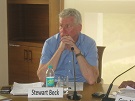Mr. Stewart Beck, former High Commissioner of Canada to India and currently President of the Vancouver based Asia-Pacific Foundation of Canada, visited the VIF on 25 May 2015 for a round table discussion on the future course of India-Canada relations. In his welcome remarks, Director VIF, Gen. NC Vij, mentioned that while bilateral business and commercial linkages are the key drivers of the wide ranging India-Canada partnership, other important areas for expanding bilateral cooperation are civil nuclear energy, renewable energy, education and skills development, agriculture, security, science, technology, innovation and space, regional and global issues.
The discussion centered around three main themes: nuclear energy co-operation; Canada-India co-operation on Afghanistan, and developing a Track-II mechanism to further strengthen Indo-Canadian bilateral relations to develop upon the positives that have emerged from the Indian Prime Minister’s visit to Canada in April 2015.  There was consensus around the table that while India and Canada have a longstanding bilateral relationship based on shared democratic values, pluralistic societies and strong people-to-people contacts, a lot more can be done to further strengthen relations between India and Canada.
There was consensus around the table that while India and Canada have a longstanding bilateral relationship based on shared democratic values, pluralistic societies and strong people-to-people contacts, a lot more can be done to further strengthen relations between India and Canada.
For an energy hungry India, energy security naturally ranks high in its list of priorities. Canada has surplus energy resources that India could tap and this can be mutually beneficial for both countries. Being amongst the top two Uranium exporting countries in the world, Canada's potential to be a partner in India's economic transformation and to meet Indian quest for clean energy is undisputable. The recent agreement on uranium sale by Canada for India’s civilian nuclear power plants heralds a new era of bilateral nuclear cooperation.
Similarly, as India looks to extend its global foot print and move beyond the Indian Ocean to engage more actively in the Pacific region, both India and Canada can pool resources to build a stable security framework in the Asia-Pacific. Maritime security cooperation can therefore be an important driver of the India-Canada friendship. This, along with strong cultural and people to people ties, and the contribution of the Indian Diaspora to both societies, creates a positive synergy in India-Canada relations.  The emergence of global terrorist threats, the conflicts in Syria and Iraq, the efforts to stabilize Afghanistan through reconciliation and economic recovery, are all areas of convergence between India and Canada and offer the opportunity to enhance dialogue and cooperation between our two countries.
The emergence of global terrorist threats, the conflicts in Syria and Iraq, the efforts to stabilize Afghanistan through reconciliation and economic recovery, are all areas of convergence between India and Canada and offer the opportunity to enhance dialogue and cooperation between our two countries.
Participants at the round table discussion included Lt. Gen. Ravi Sawhney, Mr. CD Sahay, Ambassadors Dinkar Khullar, Sheelkant Sharma, TCA Rangachari, Vice Admiral Raman Puri, Mr. Jess Dutton, Deputy High Commissioner of Canada, Ms. Theressa de Haan, Political Counselor at the Canadian High Commission, Commodore Mukesh Bhargava (retd), Vice President Larson and Toubro, Mr. Rajesh Menon, Deputy Director General, CII, Mr. Shreekumar Nair, Regional Director, CII, Brig. Vinod Anand, Mr. Sushant Sareen and Dr. Harinder Sekhon.








